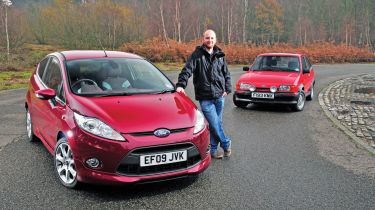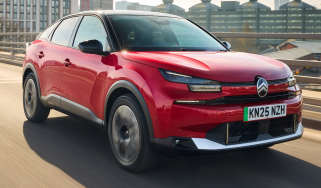Ford Fiesta
Before the highly rated diesel five-door leaves our fleet, we bring it together with its Eighties’ hot hatch forbear...
I have got a confession to make. As a teenager there was one hot hatch I hankered after more than any other: the Ford Fiesta XR2.
I knew the Peugeot 205 GTi had sharper handling and the VW Golf GTI was faster, but my student budget wouldn’t stretch to even the oldest and most abused second-hand examples of these pocket rocket thoroughbreds.
As it turned out, I didn’t have the funds to secure an XR2, either, never mind insure one. But I never forgot about the feisty Fiesta.
Fast forward 15 years and I finally got my chance to climb behind the wheel of an XR2 at our recent Greatest Ever Hot Hatches shoot-out (Issue 1,098). And to find out how far Ford’s baby had come in two decades, I took our long-term Fiesta along.
In terms of looks, the blue oval duo couldn’t be more different. The immaculate 1989 XR2 was supplied by Ford’s Heritage Centre, and it’s an Eighties’ timewarp. The straight lines and sharp creases haven’t aged well, although the eye-catching red stripes, pepperpot alloys and chunky bodykit are a reminder of when hot hatches were bold and brash.
The first thing that strikes you about the new model is its size – it’s much bigger than its predecessor. And with its swept- back headlamps, swooping lines and neat detailing, the latest car is no entry-level runaround. Climb aboard our range-topping Titanium and you’re treated to leather trim, cruise control and automatic air-con, among a host of other hi-tech features.
By comparison, the XR2 feels extremely utilitarian – although when it was new, this machine’s four-speaker stereo, sunroof and five-speed gearbox were the height of desirability and cutting-edge technology. The age gap between these cars becomes really obvious once you’re on the move. Both models have 1.6-litre four-cylinder engines, but that’s where the similarities end. The XR2’s carburettor-fed 96bhp unit has a sharp throttle response, rorty exhaust note and keen acceleration. And while the unassisted steering is heavy at parking pace, it gets lighter and more direct the faster you go.
The harsh ride and weak brakes, plus high noise and low grip levels, are stark reminders of exactly how far automotive design and engineering have come in a relatively short time. Yet that’s not to say the XR2 is not great fun: you just have to experience it in short doses.
With its refined and punchy turbodiesel engine, the Titanium feels much more grown-up. The car’s poised and agile chassis still raises a smile through a series of bends, but its smoothness, supple ride and cosseting cabin make for great long-distance cruising.
All of which means I’m sad to see our long-termer go after only three months. But there’s no need for despair, because as eagle-eyed readers will have spotted in our recent report (Fleet Watch, Issue 1,102), another Fiesta has arrived to take its place. The newcomer has a 1.4- litre petrol motor, and we want to see if it’s more cost-effective to run than the diesel. Better still, the combination of the keener, more revvy petrol unit and sharp chassis will allow me to live out the XR2 fantasies of my youth.
Extra Info
“How much do I love the Fiesta? It’s one of the best cars I’ve ever driven, combining punchy performance and decent refinement. And while I never warmed to our model’s purple paint, its slick looks just got better and better. A winner!”
Sam Hardy, Deputy Motoring Editor









